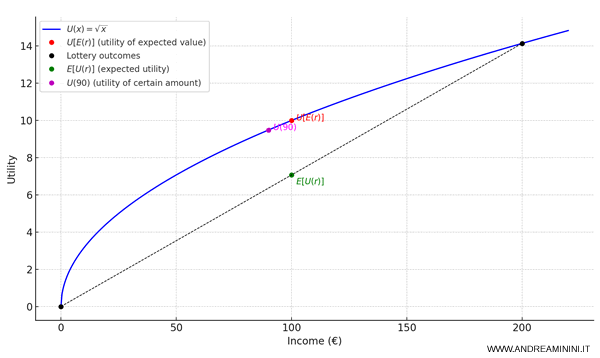Risk Attitude
Every day, we make choices under uncertainty - whether we realize it or not. Should you take that new job offer? Invest in a risky stock? Buy travel insurance? The way we handle risk says a lot about how we see the world.
In economics, this is known as risk attitude. It's not about how smart or rational you are - it's about your personal comfort with uncertainty. Some of us play it safe. Others roll the dice.
What Is Risk Attitude?
Your risk attitude reflects how you choose between a guaranteed outcome and a risky one with the same expected payoff. Imagine this:
- A 50/50 chance to win €200 or nothing (expected value: €100)
- Or take €90 for sure
Would you take the sure €90 - or gamble for a shot at €200?
Three Types of Risk Attitudes
Economists group people into three broad categories:
- Risk-averse: prefer a smaller but certain gain over a bigger, uncertain one
- Risk-neutral: focus only on expected value, regardless of uncertainty
- Risk-seeking: willing to risk losses for the chance at a higher reward
Risk-Averse: Playing It Safe
If you're risk-averse, you'd take the guaranteed €90 - even if the expected gain from the gamble is €100. Why? Because avoiding loss brings more peace of mind than the hope of a bigger win.
This preference can be visualized using a utility function, like:
$$ U(x) = \sqrt{x} $$
Here’s how it plays out:
- Expected value of the gamble: €100
- Utility of the gamble: $$ E[U(r)] = 0.5 \cdot \sqrt{200} = 7.07 $$
- Utility of the sure €90: $$ U(90) \approx 9.49 $$
So, the certain amount “feels” more valuable - even if it’s less.

Note: This isn’t irrational. It's exactly why people buy insurance or take stable job offers over riskier ventures.
Risk-Neutral: Doing the Math
Risk-neutral individuals care only about expected value. A guaranteed €100 and a 50/50 shot at €200 or nothing? Same value, same appeal.
They don’t mind the risk - they just do the numbers.
Risk-Seeking: Chasing the Upside
Risk-seekers go for the bigger payoff - even if the odds are against them. For them, the possibility of winning outweighs the comfort of certainty.
- Expected value is the same: €100
- But perceived value of the gamble feels higher
This attitude explains why some people love gambling or invest in volatile markets. It’s not about being reckless - it’s about different priorities.
What Shapes Your Risk Attitude?
Here’s the twist: your risk attitude can change. We’re not hardwired one way or the other.
We might be bold at work but cautious at home. One day we’re feeling lucky, the next we’re playing it safe. It depends on what’s at stake, how much we can afford to lose, and even our mood.
Example: An entrepreneur might bet big on a new venture but still lock up their bike with two chains. Or someone might spend €200 on lottery tickets but buy only discounted groceries. It’s not contradiction - it’s human nature.
And let’s not forget: the same person can think very differently about €200, €20,000, or €2 million. Scale matters.
Wrapping Up
Risk attitude isn’t about logic - it’s about preference. And preferences shift with time, experience, emotions, and context.
Understanding your risk profile (or someone else’s) isn’t just a fun personality test - it’s a powerful lens for understanding choices in finance, business, and life.
